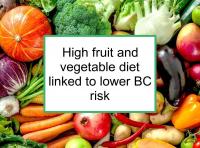Many studies have examined the links between fruit and vegetable intake and breast cancer risk. Most have reported a small reduction in risk for high compared to low levels of consumption. Now a new meta-analysis has confirmed that high fruit and vegetable intake is associated with modestly lower risk of breast cancer compared to low intake.
Food and cancer risk
Generally speaking, cancers that are strongly influenced by hormones (e.g., breast, ovarian, endometrial, and prostate cancer) appear to be the ones most influenced by overall diet. The development of other types of cancer is often influenced by a smaller group of foods. For some cancers, avoiding certain foods or lifestyle habits is more important than consuming a healthy diet. For example, gastric cancer is promoted by the consumption of salty foods and lung cancer can arise from regularly breathing hot oil fumes during cooking.
Healthy diet is not enough to be optimal
It is remarkable that the same ground is covered repeatedly with respect to studies of diet and breast cancer. Every now and then, a new study is published that provides a simple answer — usually, that fruit and vegetable consumption appears to reduce breast cancer risk, but not by much.
The progress that has been made in studying particular foods or food groups and their specific interaction with cancer development tends to be ignored by reporters when the results of the new study are described.
In fact, not all fruits and not all vegetables are equal. This is why there are no news stories admonishing us to eat peas or pears to prevent cancer whereas there are frequent articles concerning broccoli and blueberries. While it is complicated, it is worth making the effort to identify foods that prevent cancer or its recurrence. Apparently, the advice to eat five or seven servings of fruits or vegetables per day is not specific enough. The primary purpose of Food for Breast Cancer is to provide information concerning specific foods and their links to breast cancer risk and survival in an organized way.
Latest research finds fruits and vegetables reduce breast cancer risk
The study referenced at the beginning of this news article was designed to clarify the association between fruit and vegetable consumption and risk of breast cancer. To conduct the study, the authors performed a review and meta-analysis of data from existing prospective studies. Included were 15 studies published through April 2011.
Based on the summary analysis, the highest level of fruit and vegetable consumption combined was found to be associated with an 11% lower risk of breast cancer compared to the lowest level of consumption. When considered separately, the risk for the highest level of fruit intake was 8% lower than the lowest level. The risk reduction for vegetable intake was only 1% and this was not statistically significant. Based on dose-response analyses, the risk of breast cancer was reduced by 4% for every 200 g per day of fruits and vegetables combined and 6% for fruits.
The authors conclude that high intake of fruits, and fruits and vegetables combined, but not vegetables alone, is associated with a small reduction breast cancer risk.
Please see our article on how to optimize your breast cancer diet for information on what to eat during all stages of treatment and recovery.
